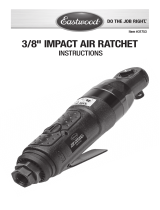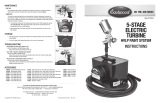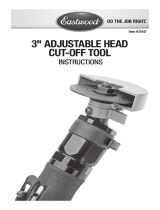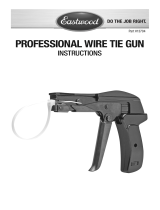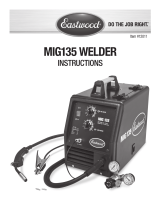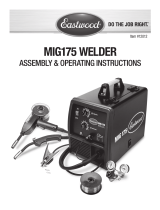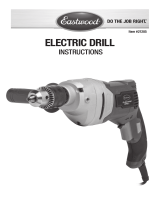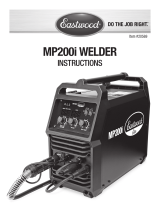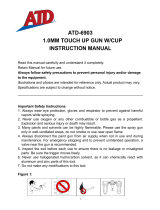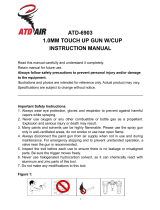
CONCOURS 2
PAINT GUN & ACCESSORY KIT
INSTRUCTIONS
© Copyright 2017 Easthill Group, Inc. 3/17 Instruction item #16287Q Rev 1
If you have any questions about the use of this product, please contact
The Eastwood Technical Assistance Service Department: 800.343.9353 >> email: techelp@eastwood.com
PDF version of this manual is available online >> eastwood.com/16287manual
The Eastwood Company 263 Shoemaker Road, Pottstown, PA 19464, USA
US and Canada: 800.343.9353 Outside US: 610.718.8335
Fax: 610.323.6268 eastwood.com
Item #16287
ADDITIONAL ITEMS
#12846Z Eastwood Aerosol Injected Cleaner
#10041Z Eastwood PRE Aerosol
#11949Z Eastwood Low VOC PRE Aerosol
#16186 Eastwood Professional Paint Gun Cleaning Set
#31624Z Kresto GT Paint Shop Heavy Duty Hand Cleaner
#31625Z Kresto GT Cherry Turbo Heavy Duty Scrubbing Wipes
#14829 Gerson OneStep Respirator

2 Eastwood Technical Assistance: 800.343.9353 >> techelp@eastwood.com To order parts and supplies: 800.343.9353 >> eastwood.com 11
The Eastwood Concours 2 HVLP Paint Gun is a precision engineered gun designed for use by
the seasoned professional or hobbyist. It is capable of producing a high-quality paint finish and will
provide many years of trouble free service. The body is constructed of a highly durable and lightweight
alloy with Stainless Steel internal components which are compatible with both solvent and water
borne coatings. Convenient reference markings on the gun body and control knobs allow for accurate
repeatability of gun settings. Designed for the ultimate in comfort and appearance.
INCLUDES
(1) HVLP Paint Gun with 1.7mm stainless steel nozzle/needle set installed (for primers & heavier-
bodied coatings)
(1) 1.3mm Stainless Steel Needle and Nozzle Set (for single stage, base coats & clears)
(1) 600ml., solvent resistant,
composite Paint Cup
(1) Paint Gun Wrench
(2) Cleaning Brushes
(1) 1/4" FNPT Quick Disconnect Fitting
(1) Regulator
(1) Aluminum Storage Case
SPECIFICATIONS
• 4.25 CFM @ 30 PSI (2 Bar)
• 1/4" male NPT air input threads
• M16 x 1.5 NPS paint cup inlet attachment threads
• 1.7 mm stainless steel needle/nozzle set installed (1.3 mm included)
DANGER indicates a hazardous situation which, if not avoided, will result in death or serious injury.
WARNING indicates a hazardous situation which, if not avoided, could result in death or serious injury.
CAUTION used with the safety alert symbol, indicates a hazardous situation which, if not avoided,
could result in minor or moderate injury.
NOTICE is used to address practices not related to personal injury.
IMPORTANT SAFETY INFORMATION
The following explanations are displayed in this manual, on the labeling,
and on all other information provided with this product:

10 Eastwood Technical Assistance: 800.343.9353 >> techelp@eastwood.com To order parts and supplies: 800.343.9353 >> eastwood.com 3
IMPORTANT SAFETY INFORMATION
GENERAL SAFETY RULES
Thoroughly read and understand these product instructions before using this
equipment. Failure to follow all warnings can result in tool damage or serious physical injury.
Keep these product instructions for future reference.
FIRE AND EXPLOSION HAZARD!
• Do Not use near sparks, open flame or other potential ignition source. Solvents
and paints are highly combustible and may ignite or explode. Keep at least 25'
away from any non-explosion proof compressors, motors, switches etc.
HEALTH HAZARDS!
• Avoid breathing vapors produced by Spray Gun. Always wear appropriate
NIOSH approved breathing apparatus and use in a well-ventilated area.
• Wear appropriate ANSI standard Z87.1 eye protection.
• Wear solvent-resistant gloves.
• Do not allow unprotected persons or pets in the spray area.
BURSTING HAZARD!
• Do not exceed 60 psi (4.1 bar) of tool inlet pressure. Permanent tool damage
and/or bursting could occur and cause personal injury.
INJURY HAZARD!
• This Paint Gun can quickly spray while handling when connected to an air
supply causing serious personal injury. Always disconnect the Paint Gun from
the air supply before adding paint, changing nozzles, removing clogs or other
maintenance.
• Use only Eastwood Aerosol Injected Cleaner, acetone or lacquer thinner to
clean guns. Use of chlorinated or halogenated hydrocarbon solvents can
corrode aluminum gun components or emit hazardous reactive gasses.
• Use for spraying paint products only. Do not use for spraying pesticides,
fertilizer, acids or other corrosive materials and solvents.
ADDITIONAL SAFETY INFORMATION
PROBLEM CAUSE CORRECTION
Gun “spurts”
at initial
trigger pull
then evens out
Air regulator
set too far back
in line causing
pressure build up
in air line
Paint gun regulator must be attached at inlet of
paint gun.
“Dogbone”
shaped spray
pattern
Inlet air pressure
too high
Decrease inlet air pressure at gun
Fluid flow
adjusted too low
Increase fluid flow adjustment on gun
Exaggerated
“Football”
shaped spray
pattern
Inlet air pressure
too low
Increase inlet air pressure at gun
Fluid flow
adjusted too high
Decrease fluid flow adjustment on gun
Paint mixture too
thick
Check paint manufacturer’s mix ratio
instructions or thin if possible
TROUBLESHOOTING (CONTINUED)

4 Eastwood Technical Assistance: 800.343.9353 >> techelp@eastwood.com To order parts and supplies: 800.343.9353 >> eastwood.com 9
SET-UP
• Remove all components from carton, identify them and become familiar with their purpose.
• A 3/8" I.D. minimum air hose at a 25' maximum length is strongly recommended for
best results. Smaller I.D. hose and greater length may reduce available CFM and produce
unsatisfactory results.
• A clean, dry, regulated air supply is required. The use of an additional “on the gun” regulator is
strongly recommended to accurately control gun pressure while painting.
• Clean out the paint cup as well as the paint gun air and paint passages with a solvent such as
Eastwood PRE or acetone to remove any residual manufacturing impurities before use. Dry
thoroughly.
IMPORTANT NOTES BEFORE PAINTING:
1. Please note that many variables affect the adjustment of a paint gun including paint
viscosity and type, atmospheric conditions such as humidity, barometric pressure and
temperature as well as air inlet pressure and operator preference. Always “tune” the
gun before each use as prevailing conditions may not be the same as the previous use.
2. It is always best to test spray on sheets of cardboard or masking paper with the actual
paint you will be applying while making your adjustments to become familiar with the
gun and achieve the ideal Fluid Control Setting.
3. Remember that a small amount of product used at this point can avoid
disappointment in your results and the need to re-do your work later.
PROBLEM CAUSE CORRECTION
“Dry” paint
appearance
Paint Gun is too
far from surface
Keep within 8" to 12"
Paint Gun being
moved too fast
over surface
Slow down gun motion over surface
Inlet air pressure
too high
Decrease gun inlet air pressure and or increase
fluid flow
Incorrect thinner/
reducer
Check paint manufacturer’s reducing/thinning
instructions
Thin paint
appearance
Paint Gun is too
far from surface
Keep within 8” to 12”
Paint Gun being
moved too fast
over surface
Slow down gun motion over surface
Inlet air pressure
too high
Decrease gun inlet air pressure and or increase
fluid flow
Incorrect thinner/
reducer
Check paint manufacturer’s reducing/thinning
instructions
Paint
spray is
sputtering
Paint Gun is dirty
or contaminated
Disassemble and clean gun with suitable solvent
Nozzle or Air cap
loose.
Tighten Nozzle and or Air Cap
Needle tip or
Nozzle seat
damaged
Replace Needle/Nozzle set
Gun being tipped
too far down
Operate gun with tip tilted no more than 45º down
or up
TROUBLESHOOTING (CONTINUED)

GUN SETTINGS
• Air Cap - Make sure the Air Cap is properly oriented in a horizontal plane to produce a vertical fan
spray pattern by viewing the HVLP Paint Gun from the front. To adjust, loosen Retaining Ring by
rotating counter-clockwise slightly, adjust Air Cap then re-tighten Retaining Ring (Fig 1).
• Fluid Control – The Fluid Control knob (located at mid-rear of gun body) regulates the distance
the Needle travels and the amount of paint flowing through the gun. Note: Generally for higher
viscosity coatings, a wider opening is desired while a closer opening is better suited for lower
viscosity fluids. To adjust, rotate the Fluid Control Knob outward (counter-clockwise as viewed
from the rear) to increase flow and turn inward to reduce flow (Fig 1).
• Fan Control – The Fan Control knob (located at the upper-rear of the paint gun body) controls
the size and shape of the spray pattern of “fan”. Rotating the knob counter-clockwise (as
viewed from the rear of the gun) will produce a larger and softer spray pattern while rotating it
clockwise will result in a smaller, sharper, round pattern. For most painting conditions, a larger,
softer fan is desired (Fig 1).
• Air Control – The Air Control knob (located at the bottom of the gun handle adjacent to the
air inlet) is opened by rotating in a counter-clockwise direction (as viewed from the bottom of
the gun). This is for “fine tuning” the airflow to the gun. You will generally want to set the inlet
pressure at the regulator, start with the Air Control in the full open position and decrease air as
needed (Fig 1).
• With practice,
you will quickly
acquire a “feel”
for the gun and
will be producing
professional
results.
• When you have
achieved your
optimal knob
settings, note their
positions with
the indicators on
the gun body and
knobs. This will
assist in quickly
“tuning” the gun in
future uses.
8 Eastwood Technical Assistance: 800.343.9353 >> techelp@eastwood.com To order parts and supplies: 800.343.9353 >> eastwood.com 5
Fan
Control
Air Cap
✓
FIG. 1
✓
Air
Control
Retaining
Ring
Fluid
Control
✓
✓
✓
PROBLEM CAUSE CORRECTION
Gun produces
an uneven
spray pattern
or fan
Paint or film
buildup on Air
Cap blocking
air holes
Disconnect air supply and clean buildup from Air
Cap
Gun “spits”
or sputters;
discharges
large droplets
Paint or film
buildup on
Needle &
Nozzle
Disconnect air supply and clean buildup from
Needle & Nozzle. Note: Use of solvent may be
helpful, removal of the Nozzle may be necessary
Gun dispenses
only a small
amount of
paint or none
at all
Clump or piece
of paint film
blocking paint
inlet port
Disconnect air supply; remove paint cup, remove
blockage from paint inlet area then strain paint or
coating to remove clumps or film
Heavy textured
or “orange
peel” paint
appearance
Paint Gun is
too close to
surface
Keep within 8" to 12"
Inlet air
pressure too
low
Increase inlet air pressure and or decrease fluid
flow
Incorrect
thinner/reducer
Check paint manufacturer’s reducing/thinning
instructions
Incorrect
material mix
ratios
Check paint manufacturer’s mix ratio instructions
Excessive runs
and sags
Paint Gun
being moved
too slowly over
surface
Speed up gun motion over surface
Excessive fluid
flow
Decrease fluid flow by adjusting “fluid” knob
Paint mixed too
thin
Check paint manufacturer’s reducing/thinning
instructions
TROUBLESHOOTING

6 Eastwood Technical Assistance: 800.343.9353 >> techelp@eastwood.com To order parts and supplies: 800.343.9353 >> eastwood.com 7
As an alternative, # 12846Z Eastwood Aerosol Injected Gun Cleaner
is excellent for this purpose.
CLEAN-UP
• Disconnect air supply to gun.
• Remove Paint Cup and pour unused coating into proper disposal container.
• Wipe out any excess coating, then thoroughly rinse the Paint Cup with a mild solvent compatible
with the coating being used.
• Pour a small amount of a solvent compatible with the paint being used in to the Paint Cup then
attach Paint Cup, run solvent through HVLP Gun in a safe area until it flows clear.
• Remove air supply from HVLP Gun.
• Pour out any unused solvent and remove paint cup.
• Allow solvent to dry completely from all components.
PAINT GUN DISASSEMBLY FOR ADDITIONAL
CLEANING OR REBUILDING
• Remove Air Cap by
unthreading and removing
Retaining Ring (Fig 1).
• Remove Nozzle with a 10mm
wrench which is included
(Fig 2).
• Remove the tan plastic oval
shaped Air Manifold from
the front of the Gun Body
(Fig 3).
• Unthread and remove Fluid
Control Knob from rear of
Paint Gun body.
REASSEMBLY
• Set the tan plastic Air
Manifold into the oval shaped
recess in the front of the Gun
Body (Fig 5).
• Replace Needle by sliding
into bore in rear of Paint Gun
body until it seats (Fig 6).
• Slide Needle Tension Spring
w/bushing over the rear of
the Needle (Fig 7).
• Replace Nozzle by threading
into front of Gun Body and
tighten firmly with included
10mm wrench (do not-over
tighten).
• Replace Air cap by threading
Retaining Ring onto Gun
Body. Make sure the air
horns of the Air Cap are
oriented properly.
FIG. 2
FIG. 3
FIG. 4
FIG. 5
FIG. 7
• Carefully remove Tension
Coil Spring with Bushing and
Needle by firmly gripping
rear of Needle and pulling
out through rear of Paint Gun
body (Fig 4).
FIG. 6
Nozzle
✓
R
e
m
o
v
e
10mm
Tan
Plastic
Air
Manifold
✓
Needle
✓
Tension
Spring
✓
✓
Oval
Recess
✓
Needle
✓
Tension
Spring
✓
Tension
Spring
✓
✓
Needle
✓

6 Eastwood Technical Assistance: 800.343.9353 >> techelp@eastwood.com To order parts and supplies: 800.343.9353 >> eastwood.com 7
As an alternative, # 12846Z Eastwood Aerosol Injected Gun Cleaner
is excellent for this purpose.
CLEAN-UP
• Disconnect air supply to gun.
• Remove Paint Cup and pour unused coating into proper disposal container.
• Wipe out any excess coating, then thoroughly rinse the Paint Cup with a mild solvent compatible
with the coating being used.
• Pour a small amount of a solvent compatible with the paint being used in to the Paint Cup then
attach Paint Cup, run solvent through HVLP Gun in a safe area until it flows clear.
• Remove air supply from HVLP Gun.
• Pour out any unused solvent and remove paint cup.
• Allow solvent to dry completely from all components.
PAINT GUN DISASSEMBLY FOR ADDITIONAL
CLEANING OR REBUILDING
• Remove Air Cap by
unthreading and removing
Retaining Ring (Fig 1).
• Remove Nozzle with a 10mm
wrench which is included
(Fig 2).
• Remove the tan plastic oval
shaped Air Manifold from
the front of the Gun Body
(Fig 3).
• Unthread and remove Fluid
Control Knob from rear of
Paint Gun body.
REASSEMBLY
• Set the tan plastic Air
Manifold into the oval shaped
recess in the front of the Gun
Body (Fig 5).
• Replace Needle by sliding
into bore in rear of Paint Gun
body until it seats (Fig 6).
• Slide Needle Tension Spring
w/bushing over the rear of
the Needle (Fig 7).
• Replace Nozzle by threading
into front of Gun Body and
tighten firmly with included
10mm wrench (do not-over
tighten).
• Replace Air cap by threading
Retaining Ring onto Gun
Body. Make sure the air
horns of the Air Cap are
oriented properly.
FIG. 2
FIG. 3
FIG. 4
FIG. 5
FIG. 7
• Carefully remove Tension
Coil Spring with Bushing and
Needle by firmly gripping
rear of Needle and pulling
out through rear of Paint Gun
body (Fig 4).
FIG. 6
Nozzle
✓
R
e
m
o
v
e
10mm
Tan
Plastic
Air
Manifold
✓
Needle
✓
Tension
Spring
✓
✓
Oval
Recess
✓
Needle
✓
Tension
Spring
✓
Tension
Spring
✓
✓
Needle
✓

GUN SETTINGS
• Air Cap - Make sure the Air Cap is properly oriented in a horizontal plane to produce a vertical fan
spray pattern by viewing the HVLP Paint Gun from the front. To adjust, loosen Retaining Ring by
rotating counter-clockwise slightly, adjust Air Cap then re-tighten Retaining Ring (Fig 1).
• Fluid Control – The Fluid Control knob (located at mid-rear of gun body) regulates the distance
the Needle travels and the amount of paint flowing through the gun. Note: Generally for higher
viscosity coatings, a wider opening is desired while a closer opening is better suited for lower
viscosity fluids. To adjust, rotate the Fluid Control Knob outward (counter-clockwise as viewed
from the rear) to increase flow and turn inward to reduce flow (Fig 1).
• Fan Control – The Fan Control knob (located at the upper-rear of the paint gun body) controls
the size and shape of the spray pattern of “fan”. Rotating the knob counter-clockwise (as
viewed from the rear of the gun) will produce a larger and softer spray pattern while rotating it
clockwise will result in a smaller, sharper, round pattern. For most painting conditions, a larger,
softer fan is desired (Fig 1).
• Air Control – The Air Control knob (located at the bottom of the gun handle adjacent to the
air inlet) is opened by rotating in a counter-clockwise direction (as viewed from the bottom of
the gun). This is for “fine tuning” the airflow to the gun. You will generally want to set the inlet
pressure at the regulator, start with the Air Control in the full open position and decrease air as
needed (Fig 1).
• With practice,
you will quickly
acquire a “feel”
for the gun and
will be producing
professional
results.
• When you have
achieved your
optimal knob
settings, note their
positions with
the indicators on
the gun body and
knobs. This will
assist in quickly
“tuning” the gun in
future uses.
8 Eastwood Technical Assistance: 800.343.9353 >> techelp@eastwood.com To order parts and supplies: 800.343.9353 >> eastwood.com 5
Fan
Control
Air Cap
✓
FIG. 1
✓
Air
Control
Retaining
Ring
Fluid
Control
✓
✓
✓
PROBLEM CAUSE CORRECTION
Gun produces
an uneven
spray pattern
or fan
Paint or film
buildup on Air
Cap blocking
air holes
Disconnect air supply and clean buildup from Air
Cap
Gun “spits”
or sputters;
discharges
large droplets
Paint or film
buildup on
Needle &
Nozzle
Disconnect air supply and clean buildup from
Needle & Nozzle. Note: Use of solvent may be
helpful, removal of the Nozzle may be necessary
Gun dispenses
only a small
amount of
paint or none
at all
Clump or piece
of paint film
blocking paint
inlet port
Disconnect air supply; remove paint cup, remove
blockage from paint inlet area then strain paint or
coating to remove clumps or film
Heavy textured
or “orange
peel” paint
appearance
Paint Gun is
too close to
surface
Keep within 8" to 12"
Inlet air
pressure too
low
Increase inlet air pressure and or decrease fluid
flow
Incorrect
thinner/reducer
Check paint manufacturer’s reducing/thinning
instructions
Incorrect
material mix
ratios
Check paint manufacturer’s mix ratio instructions
Excessive runs
and sags
Paint Gun
being moved
too slowly over
surface
Speed up gun motion over surface
Excessive fluid
flow
Decrease fluid flow by adjusting “fluid” knob
Paint mixed too
thin
Check paint manufacturer’s reducing/thinning
instructions
TROUBLESHOOTING

4 Eastwood Technical Assistance: 800.343.9353 >> techelp@eastwood.com To order parts and supplies: 800.343.9353 >> eastwood.com 9
SET-UP
• Remove all components from carton, identify them and become familiar with their purpose.
• A 3/8" I.D. minimum air hose at a 25' maximum length is strongly recommended for
best results. Smaller I.D. hose and greater length may reduce available CFM and produce
unsatisfactory results.
• A clean, dry, regulated air supply is required. The use of an additional “on the gun” regulator is
strongly recommended to accurately control gun pressure while painting.
• Clean out the paint cup as well as the paint gun air and paint passages with a solvent such as
Eastwood PRE or acetone to remove any residual manufacturing impurities before use. Dry
thoroughly.
IMPORTANT NOTES BEFORE PAINTING:
1. Please note that many variables affect the adjustment of a paint gun including paint
viscosity and type, atmospheric conditions such as humidity, barometric pressure and
temperature as well as air inlet pressure and operator preference. Always “tune” the
gun before each use as prevailing conditions may not be the same as the previous use.
2. It is always best to test spray on sheets of cardboard or masking paper with the actual
paint you will be applying while making your adjustments to become familiar with the
gun and achieve the ideal Fluid Control Setting.
3. Remember that a small amount of product used at this point can avoid
disappointment in your results and the need to re-do your work later.
PROBLEM CAUSE CORRECTION
“Dry” paint
appearance
Paint Gun is too
far from surface
Keep within 8" to 12"
Paint Gun being
moved too fast
over surface
Slow down gun motion over surface
Inlet air pressure
too high
Decrease gun inlet air pressure and or increase
fluid flow
Incorrect thinner/
reducer
Check paint manufacturer’s reducing/thinning
instructions
Thin paint
appearance
Paint Gun is too
far from surface
Keep within 8” to 12”
Paint Gun being
moved too fast
over surface
Slow down gun motion over surface
Inlet air pressure
too high
Decrease gun inlet air pressure and or increase
fluid flow
Incorrect thinner/
reducer
Check paint manufacturer’s reducing/thinning
instructions
Paint
spray is
sputtering
Paint Gun is dirty
or contaminated
Disassemble and clean gun with suitable solvent
Nozzle or Air cap
loose.
Tighten Nozzle and or Air Cap
Needle tip or
Nozzle seat
damaged
Replace Needle/Nozzle set
Gun being tipped
too far down
Operate gun with tip tilted no more than 45º down
or up
TROUBLESHOOTING (CONTINUED)

10 Eastwood Technical Assistance: 800.343.9353 >> techelp@eastwood.com To order parts and supplies: 800.343.9353 >> eastwood.com 3
IMPORTANT SAFETY INFORMATION
GENERAL SAFETY RULES
Thoroughly read and understand these product instructions before using this
equipment. Failure to follow all warnings can result in tool damage or serious physical injury.
Keep these product instructions for future reference.
FIRE AND EXPLOSION HAZARD!
• Do Not use near sparks, open flame or other potential ignition source. Solvents
and paints are highly combustible and may ignite or explode. Keep at least 25'
away from any non-explosion proof compressors, motors, switches etc.
HEALTH HAZARDS!
• Avoid breathing vapors produced by Spray Gun. Always wear appropriate
NIOSH approved breathing apparatus and use in a well-ventilated area.
• Wear appropriate ANSI standard Z87.1 eye protection.
• Wear solvent-resistant gloves.
• Do not allow unprotected persons or pets in the spray area.
BURSTING HAZARD!
• Do not exceed 60 psi (4.1 bar) of tool inlet pressure. Permanent tool damage
and/or bursting could occur and cause personal injury.
INJURY HAZARD!
• This Paint Gun can quickly spray while handling when connected to an air
supply causing serious personal injury. Always disconnect the Paint Gun from
the air supply before adding paint, changing nozzles, removing clogs or other
maintenance.
• Use only Eastwood Aerosol Injected Cleaner, acetone or lacquer thinner to
clean guns. Use of chlorinated or halogenated hydrocarbon solvents can
corrode aluminum gun components or emit hazardous reactive gasses.
• Use for spraying paint products only. Do not use for spraying pesticides,
fertilizer, acids or other corrosive materials and solvents.
ADDITIONAL SAFETY INFORMATION
PROBLEM CAUSE CORRECTION
Gun “spurts”
at initial
trigger pull
then evens out
Air regulator
set too far back
in line causing
pressure build up
in air line
Paint gun regulator must be attached at inlet of
paint gun.
“Dogbone”
shaped spray
pattern
Inlet air pressure
too high
Decrease inlet air pressure at gun
Fluid flow
adjusted too low
Increase fluid flow adjustment on gun
Exaggerated
“Football”
shaped spray
pattern
Inlet air pressure
too low
Increase inlet air pressure at gun
Fluid flow
adjusted too high
Decrease fluid flow adjustment on gun
Paint mixture too
thick
Check paint manufacturer’s mix ratio
instructions or thin if possible
TROUBLESHOOTING (CONTINUED)

2 Eastwood Technical Assistance: 800.343.9353 >> techelp@eastwood.com To order parts and supplies: 800.343.9353 >> eastwood.com 11
The Eastwood Concours 2 HVLP Paint Gun is a precision engineered gun designed for use by
the seasoned professional or hobbyist. It is capable of producing a high-quality paint finish and will
provide many years of trouble free service. The body is constructed of a highly durable and lightweight
alloy with Stainless Steel internal components which are compatible with both solvent and water
borne coatings. Convenient reference markings on the gun body and control knobs allow for accurate
repeatability of gun settings. Designed for the ultimate in comfort and appearance.
INCLUDES
(1) HVLP Paint Gun with 1.7mm stainless steel nozzle/needle set installed (for primers & heavier-
bodied coatings)
(1) 1.3mm Stainless Steel Needle and Nozzle Set (for single stage, base coats & clears)
(1) 600ml., solvent resistant,
composite Paint Cup
(1) Paint Gun Wrench
(2) Cleaning Brushes
(1) 1/4" FNPT Quick Disconnect Fitting
(1) Regulator
(1) Aluminum Storage Case
SPECIFICATIONS
• 4.25 CFM @ 30 PSI (2 Bar)
• 1/4" male NPT air input threads
• M16 x 1.5 NPS paint cup inlet attachment threads
• 1.7 mm stainless steel needle/nozzle set installed (1.3 mm included)
DANGER indicates a hazardous situation which, if not avoided, will result in death or serious injury.
WARNING indicates a hazardous situation which, if not avoided, could result in death or serious injury.
CAUTION used with the safety alert symbol, indicates a hazardous situation which, if not avoided,
could result in minor or moderate injury.
NOTICE is used to address practices not related to personal injury.
IMPORTANT SAFETY INFORMATION
The following explanations are displayed in this manual, on the labeling,
and on all other information provided with this product:

CONCOURS 2
PAINT GUN & ACCESSORY KIT
INSTRUCTIONS
© Copyright 2017 Easthill Group, Inc. 3/17 Instruction item #16287Q Rev 1
If you have any questions about the use of this product, please contact
The Eastwood Technical Assistance Service Department: 800.343.9353 >> email: techelp@eastwood.com
PDF version of this manual is available online >> eastwood.com/16287manual
The Eastwood Company 263 Shoemaker Road, Pottstown, PA 19464, USA
US and Canada: 800.343.9353 Outside US: 610.718.8335
Fax: 610.323.6268 eastwood.com
Item #16287
ADDITIONAL ITEMS
#12846Z Eastwood Aerosol Injected Cleaner
#10041Z Eastwood PRE Aerosol
#11949Z Eastwood Low VOC PRE Aerosol
#16186 Eastwood Professional Paint Gun Cleaning Set
#31624Z Kresto GT Paint Shop Heavy Duty Hand Cleaner
#31625Z Kresto GT Cherry Turbo Heavy Duty Scrubbing Wipes
#14829 Gerson OneStep Respirator
/

